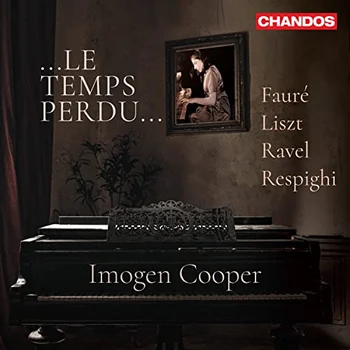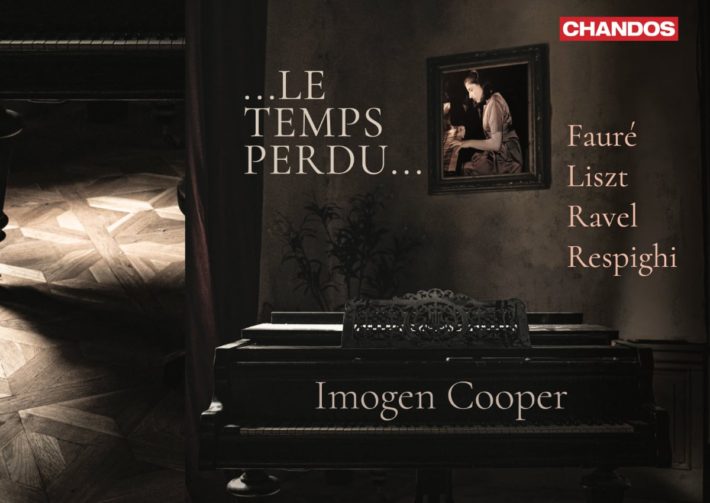The title of Imogen Cooper’s new release references Proust’s epic 7-volume novel, À la recherche du temps perdu. The diverse selections of piano works ranging from Ravel to Resphigi in fact hearken back to her own “lost time”: these are works she hasn’t performed on the concert stage as an adult but felt compelled to come back to after many years. And so, the album seems as much a re-exploration of herself as a musician as it is of the pieces she studied in her youth.

Fauré’s Thème et Variations is one of the highlights, showing the pianist’s ability to capture varied (and often quickly changing) moods. An austere but dignified theme (track 15) takes on a more reminiscent and solitary presence in the first variation, where it saunters through the meandering backdrop of the right hand. A running pattern throughout the work is how conventionally secondary voices assume a more central role—the fourth variation (track 19) illustrates this well, especially in how Cooper gives the inner melodic line a rhapsodic polish. She also devotes some good thought to the relationship between the two main voices of the sixth variation (track 21). Despite moving in opposite directions, they still complement each other in their dialogue.
Listeners accustomed to a Ravel Sonatine à la Chamayou or Thibaudet might find Cooper’s an acquired taste. While delicate and shimmering, the work also speaks to an imaginative spontaneity. For me, this particular rendition feels too carefully thought out. Yes, there is sensitivity in the subito dynamic changes of the Modéré (track 9); the accompanimental textures are articulated quite clearly as well. Somehow, though, these artistic choices don’t quite suit the music, making it somewhat stodgy where it could be more free-flowing. The attention to details works better in the following Mouvement de Menuet, where we can hear the singing phrases against the well-calibrated vertical textures. Cooper’s interpretation is less dreamy than it is introspective; however, it still offers a lovely sense of nostalgia and presents a vivid shift in character from the outer movements. The Animé is again a bit heavy and loses some of its signature fleet-footed excitement.
The pianist chooses to put the two “Jeux d’eau” (by Liszt and Ravel, respectively) side by side—an illuminating choice that demonstrates how uniquely the composers portray similar subject matter. Cooper’s bright and full sound complements Liszt’s version (track 12) nicely, evoking the image of a luscious fountain: we can hear, for example, the effervescent gushes of the opening arpeggios. Her Ravel (track 13) is just as successful in bringing out water’s more translucent brilliance. In choosing to emphasize some of the distinct inner patterns (like the descending whole-tone scale in 0:19-0:22), we become aware of the momentary yet refreshing departures from the surrounding tonality. For all its delicacy, the interpretation also shows Cooper’s ability to shape the melodies lyrically and seamlessly—a feat, considering Ravel’s occasionally challenging hand crossings.
Resphigi’s Notturno rounds out the album in beautiful fashion. Here, Cooper combines dreamy Impressionism with an expressive, almost operatic singing quality. A retrospective tenderness resides at the heart of the work, which she makes especially evident at the conclusion. Barely above a whisper, it still leaves us with a feeling of comfort.
I found the sound engineering of middling quality- it lends a rather crystalline, if not occasionally angular edge to the performances. In works like the Sonatine, this regretfully takes away from the overall listening experience and the artist’s otherwise masterful nuances. The liner notes do fare better: the descriptions of the pieces are succinct but well-crafted to offer interesting historical and musical perspective. Cooper’s own notes are generous in length but an important read; it speaks to a deep personal conviction that ties the range of works together.
Despite a few misses, it’s evident that Cooper puts care and reflection into every note that she plays. With this understanding, this album is well worth the listen for its revelations into the insights of both the music and the performer.
Recommended Comparisons
Chamayou | Gieseking | Grimaud | Lortie
“…Le Temps perdu…”
Ravel:
Valses nobles et sentimentales, M 61
Sonatine, M 40
Jeux d’eau, M 30
Liszt:
Les Jeux d’eaux à la Villa d’Este
Hungarian Rhapsody No. 13, S 244 No. 13
Réminiscences de Lucia di Lammermoor de Donizetti
Fauré
Thème et variations, Op. 73
Respighi
Notturno, P 44 No. 3



















